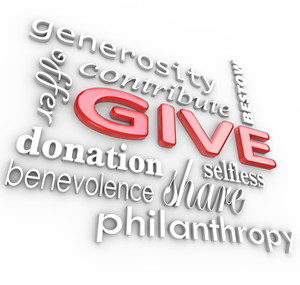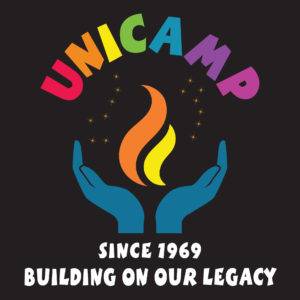CUC eNews: May 22, 2019 – Issue 91
In This Issue:
- Generosity: More Than Just Giving
- The Pact For a Green New Deal: Update
- Youth Participant in UU-UNO Spring Seminar Values the Experience
- Overseas Unitarian Congregations Looking for Partners
- Benefit From Nature at Unicamp!
- Upcoming Events You Won’t Want to Miss
Generosity: More Than Just Giving
Canadians are ranked highly in terms of giving – of money, food and clothing, tickets to charity draws, buying Girl Guide cookies, volunteer hours for coaching and organizations, contributions to research and children’s camps – the list of what and how Canadians give is long and varied. Many of you reading this article give of your time and energy to your congregation and local groups, in addition to giving in other ways.
You do it because it is the right thing to do.
Research shows that people find it inherently more satisfying to give to others than to receive. In a controlled experiment, social psychologist Liz Dunn and associates gave students at the University of British Columbia an envelope containing money, and told them that they either (1) had to spend the money on themselves before 5 p.m. that day, or (2) had to spend the money on someone else before 5 p.m. In some cases, there was $5 in the envelope, and in other cases, there was $20. The amount didn’t matter – the results were the same: those who gifted for others were happier than those who gifted for themselves, defying some students’ predictions that they would be happier spending the money on themselves. [Source: Psychology Today, December 25, 2010]
This spirit of generosity goes beyond merely giving. What is generosity? According to research by the University of Notre Dame, generosity is defined as “the virtue of giving good things to others freely and abundantly.” Thus defined, generosity is giving good things, giving abundantly, and giving freely.
The CUC has experienced the generosity of Unitarian Universalists across the country. UUs give generously of their time and their money to their congregations, and to local, national and international organizations which align with their beliefs and priorities. Some of the ways in which the CUC has experienced your generosity include:
-
- The Sharing Our Faith fund, which supports growth initiatives by UU communities, and has received from, and given to, congregations over $210,000 since 2002.
- The Support the Dawning Future leadership subsidies for youth and young adults has already helped over 20 young people participate in leadership opportunities in 2019 alone.
- Friends of the CUC, who support the work of Growing Vital Unitarian Communities directly, have given over $180,000 in the past 5 years. These funds support congregational engagement work, and programs like the Truth, Healing and Reconciliation initiative.
- The Theological Education Fund supports students on their ministerial journeys, with collections from ministerial ordinations and installations, and contributions from the First Unitarian Congregation of Toronto. This fund has alleviated the financial burden of more than a dozen ministers in the last ten years.
- The Every Child Is Our Child program in Ghana, a partnership between the CUC and the UU-United Nations Office in New York, helps children made vulnerable by HIV/ AIDS by purchasing supplies so the children can go to school, and ensuring that they and the families they live with have access to health care.
We hope that your congregation, a young leader or ministerial student you know has benefited from the collective generosity of Canadian UUs.
Why do you give? Because you care. And because it’s the right thing to do.
Please give as generously as you are able, to a fund of your choice.
The Pact For a Green New Deal: Update
The Pact for a Green New Deal launched on May 6, 2019. The CUC signed the Pact, as have over 45,000 people. This ambitious plan is needed to deal with the multiple impacts of the climate crisis. We need a Green New Deal!
The Green New Deal is a plan for massive public investment to meet the demands of the justice and climate crisis, see the full implementation of the United Nation Declaration on the Rights of Indigenous Peoples, the Right to Free Prior and Informed Consent, and the Truth and Reconciliation Recommendations, and create more than a million jobs in the process. It’s a plan to cut our national emissions in half within a decade in a way that works for working-class families and creates millions of jobs in the process. The Green New Deal is far-reaching and requires a transformative policy platform stretching across sectors and jurisdictions.
Town Hall conversations have already started; over 200 Town Halls have been organized to date. People from all walks of life will gather in their communities to discuss what is needed in a Green New Deal. Leslie Solomonian from the First Unitarian Congregation of Toronto has been concerned for a long time about the environmental crisis, and when the email about the Pact for a Green New Deal landed in her inbox, she knew that this was something she could do. Leslie was one of the first ones to sign on to organize a Town Hall. The one that she skillfully put together on May 21 at First Toronto drew over 250 people. Join a Town Hall near you (view the map of the 100+ Town Halls cross Canada). No Town Halls near you? Organize one!
Join us! Your voice matters. Support this growing movement by:
-
- Signing the Pact for a Green New Deal in Canada – Notify your MP that you took the pledge as you sign up.
- Joining the Pact as a congregation or a group
- Help spread the word through draft e-blasts and support graphics
Join the Pact for a Green New Deal
Youth Participant in UU-UNO Spring Seminar Values the Experience

(L-R) Taz (CA), Lark and Ash (US)
Each year the Unitarian Universalist United Nations Office (UU-UNO) hosts its Intergenerational Spring Seminar. The 2019 theme was Equity in Action: Gender in an Intersecting World and looked at how to engage locally and globally to support gender equity and take action to address the global trends of misogyny, transphobia, homophobia, and other oppressions.
Taz Trefzger, a youth from the Kingston Unitarian Fellowship, was one of two Canadian youth participants this year. They had participated in a previous seminar two years ago but found the topic this year especially relatable.
“This year the topic was about non-binary genders and gender equity and intersectionality”, they said, “and I’m non-binary so it helped make it a lot more applicable to my everyday life and it was a much more touchable topic”.
Taz was this year’s junior youth dean for the seminar, meaning they took an active role in planning many of the events, and they also served on the workshops committee, resulting in a workshop they planned and led on gender equity and how it relates to Unitarian Universalism. They found participating in the seminar was a good way to meet Unitarians from outside Canada, and were able to both share with and learn much from American participants during the event.
Taz acknowledges the seminar’s relatively high cost may be a barrier to broader attendance by Canadian youth, but says their youth group helped meet this challenge by serving food for fundraisers for the local charity Child Haven International. They encourage Canadian youth to think creatively about opportunities in their communities for raising the necessary funds, for they believe the cost was definitely worth it.
“Often it’s hard for youth — like it’s hard for everybody to really feel like they’re changing the world but especially youth ‘cause less life experience I guess”, they said. “But it’s really cool to be in a space where everyone feels empowered, and it feels like they can do something about the world. And there are things that they set up that you can do. So, I think it’s a very important thing for every youth group to go at least one”.
Additional information:
Read the CUC’s Statement of Solidarity with Trans and Nonbinary UUs
Transforming Hearts – From the website: “The Transforming Hearts Collective represents a vision of a world in which queer and trans people can show up fully as ourselves in all of the places we call home”.
Learn About the Upcoming 2020 Intergenerational Spring Seminar
Overseas Unitarian Congregations Looking for Partners
By Rev. Roger Bertschausen, Executive Director of the UU Partner Church Council
The Unitarian Universalist Partner Church Council, a U.S. and Canadian organization that supports overseas partnerships, is eagerly looking for new partners. It has a too-long waiting list of congregations in Northeast India, the Philippines, and Transylvania/Hungary that are seeking a Canadian or U.S. partner. Right now, the only CUC congregations with active overseas partnerships are North Shore Unitarian Church in West Vancouver, BC, the Unitarian Church of Vancouver, BC, and the Unitarian Fellowship of London, ON.
Having a partnership with an overseas Unitarian congregation is a wonderful way to broaden and deepen Unitarians’ understandings of their global faith. A Transylvanian or Hungarian partner will help you learn about the roots of Unitarianism and the resiliency that enabled it to survive centuries of oppression. A Philippines partnership will help you learn how Unitarianism can thrive in a very different demographic from most North American Unitarian congregations. A Northeast Indian partnership will provide an example of what a congregation feels like that is thoroughly multi-generational, with youth and young adults in leadership roles in every service.
International Unitarian partnerships also give those in Canada and the U.S. an opportunity to sharpen their multicultural competence with people who are both different from them but also kinfolk in faith. There is a grace that the kinship provides. Participants are able to make mistakes, learn, and remain connected. Nothing helped the mostly white U.S. congregation I served more in interacting with people in their own community who were not white than their international partnerships with congregations in Transylvania and the Philippines. They learned in overseas partnerships how to walk with others in mutual relationship. They learned to unlearn—or at least began to unlearn—colonialist/imperialist patterns.
Partnership with an overseas congregation is a powerful, illuminating embodiment of mutual relationship. It is about parity, not charity. It is mutual and reciprocal—and it is life-changing for individuals and congregations.
Check Out the Overseas Congregations Seeking Partners
Benefit from Nature at Unicamp!
Scientific publications have confirmed what we knew for decades – a walk in the woods does wonders for our health. Analysis of 143 empirical studies demonstrates various effects of so-called forest bathing (Shinrin-yoku in Japanese).
Exposure to forests boosts our immune system. Numerous studies show that simply sitting looking at trees reduces blood pressure, cortisol, and adrenaline. Research has shown that hospital patients with a green view took less pain medication compared to patients with a view of a cement wall. Forest bathing significantly decreased anxiety, depression, anger, confusion, and fatigue. Spending time in nature, looking at plants, water, and birds gives the cognitive portion of our brain a rest and allows for better focus and patience.
A recent meta-analysis reviewed scientific results which demonstrated exposure to green spaces is associated with physiological effects such as decreased salivary cortisol, cholesterol, and an increase in self-reported health. Other statistically significant associations included; better outcomes regarding stroke, hypertension, asthma, reduced diastolic blood pressure, heart rate, glucose dysregulation, when compared to baseline measurements.
The great outdoors offers the opportunity for physical activity, stress reduction and social cohesion with numerous health benefits. Also with fresh air, we breathe in airborne chemicals called phytoncides, which have antibacterial and antifungal qualities. Our bodies respond by increasing a white blood cell called NK, which kills infected cells. Increased NK activity from 3-days of forest bathing lasted for more than a month. Exposure to a diverse variety of bacteria in natural areas conveys immunoregulatory benefits and reduces inflammation.
In children, fatigue causes an inability to pay attention and control impulses. The part of the brain affected by attention fatigue (right prefrontal cortex) is linked to attention deficit disorders. Studies show that children who spent time outdoors had a reduction in attention fatigue and attention-deficit/hyperactivity disorder symptoms. Researchers are investigating the use of natural environments for treatment as being accessible, inexpensive and free of side effects.
For more information, read ”The Health Benefits of the Great Outdoors” in the October 2018 issue of Environmental Research, Volume 166. Do your own research by visiting and enjoying Unicamp (visit unicampofontario.ca for info)!
From the website: Unicamp is a Unitarian Universalist camp located in the Mulmur Hills near Honeywood, Ontario. We are committed to providing a safe and welcoming seasonal camp and spiritual retreat to our diverse community. Our programs and activities are designed to grow awareness and practice of the UU values in which our camp is rooted. We offer summer camps and activities for children, youth and adults.
Like the Canadian Unitarian Council on Facebook!
Upcoming Events 2019
Share what’s going on in your congregation. Contact communications@cuc.ca
Deadline: 14th of each previous month.
Regional
Eastern Region Fall Gathering, October 19, Hosted by the First Unitarian Congregation of Ottawa
More information and registration coming soon.
Western Region Fall Gathering, October 19 – 21, Unitarian Church of Edmonton
Hosted by the Unitarian Church of Edmonton and the Westwood Unitarian Congregation, Theme: Towards A Thriving Future.
More information and registration available by the end of June.
International
UUA General Assembly 2019: June 19-23, Spokane, WA
General Assembly (GA) is the annual meeting of our Unitarian Universalist Association (UUA). Attendees worship, witness, learn, connect, and make policy for the Association through the democratic process.
International Council of Unitarians and Universalists (ICUU) Meeting & Conference, October 26 – November 1, 2020, Montreal, Canada (more information coming soon)
Youth and Young Adult
Online – Gathered Here: Young Adult Check-In, June 10, July 8, August 12, 8 p.m. ET
Gathered Here is a monthly online check-in and gathering for Canadian Unitarian Universalist young adults.
Roundtables and Training
Online -THR: Reconciliation Through Film
Film: The Road Forward – Registration: April 27- May 22
Watch the film and read the materials: May 22 – June 5
Reflection Group: Wednesday, June 5, 7:00-8:30 p.m. ET and Saturday, June 8, 12:30-2:00 p.m. ET
Serving With Spirit: Leadership Development
Serving With Spirit Nurturing UU Leaders – EAST, 3-day retreat, Friday, July 26 – 28
Carleton University, ON, Registration deadline: June 24
We invite you to a weekend to explore where you find the “springs” which fill your life’s well of energy, and how you can live out of that rich resource.
Facilitators: Revs. Peter Boullata and Linda Thomson
Serving With Spirit Nurturing UU Leaders – WEST, 3-day retreat, August 9 – 11
Providence Renewal Centre, Edmonton, AB, Registration deadline: July 10
Facilitators: Revs. Anne Barker and Chris Wulff
Online & In-person – Serving With Spirit: Stronger Together, Planning for Partnership, 1-day workshop, August 10
Providence Renewal Centre, Edmonton, AB, Registration deadline: July 10
Facilitator: Rev. Joan Van Becelaer

